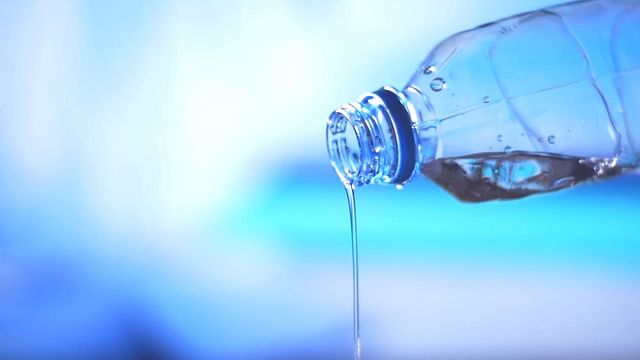The summer heat is here: How much water should you drink?
It's good sense to drink enough water at any point in your life regardless of the elements. But during the summer months, staying hydrated is not just a matter of someone's health, but their safety as well.
With temperatures in the 90s and sweltering humidity common in the south, it's important to hydrate, especially if you're exercising or working outside.
Shelly Wegman, a registered dietitian with UNC Rex, said it's most important to start drinking water early in the day to be mindful about how much fluid you're getting. Exactly how much you need to drink depends on a variety of factors, including how active you are on a given day.
Water is optimal, but you can also drink moderate amounts of tea and coffee. Fruit-infused waters are acceptable and you can also get water from eating fruits and vegetables.
Wegman spoke with WRAL about building good habits when it comes to drinking water during the summer.
Why is staying hydrated important?
Hydration is essential because fluid regulates the body temperature. It keeps the joints lubricated. It helps with elimination and waste and preventing headaches. It can also improve sleep, mood and cognition. When you're dehydrated, all of those are impacted.
What does heat and sweating do to your hydration level?
You're losing fluid through sweat, so you're getting dehydrated. It's a delicate balancing act because it can mess up your electrolyte balance and that's why people get headaches and dizzy. When your electrolytes are thrown off, it can lead to heat exhaustion and even heat illness, heat stroke. There are some serious considerations when you're doing a lot of activities outdoors in the heat. There's a big risk for children because it's really hard for them to tell when they're dehydrated. The elderly, as well, don't really recognize when they're thirsty. It becomes a major issue for them to be dehydrated and if they're not in great health to begin with, it can be a cascade effect and you can end up in the emergency department.
What are some common misconceptions you've encountered surrounding how much to drink?
The rule about eight 8-once glasses a day is not really based in science. There's no real actual number for hydration. Some people will recommend 64 ounces, 100 ounces. It actually has to do with where the hydration is coming from, how much you sweat, fluid losses through urine, things like that.
The general rule of thumb is to definitely drink water throughout the day. Unsweetened tea and coffee count toward your fluid. Fruits and vegetables can count toward your fluid intake. There are a lot of vegetables that are 60 to 90 percent water. What I tell people is to check urine. It's going to be most concentrated first thing in the morning. It should lighten up through the day. If you find at your desk job, if you can sit there and not have to go to the bathroom for four to five hours, you're probably dehydrated. It is more of an awareness and just starting to drink early in the day and keep up with it as much as you can. The amount [to drink] depends on each person.
Drinking enough water is crucial. It moves all the nutrients through your body. It helps eliminate waste and clean the toxins from your body. Your kidneys are a giant filter. If things aren't being filtered, that's bad news for the rest of the body's systems. You do need to keep things moving. The body temperature regulation is a big one during the heat. It is very crucial.
Is there such a thing as over hydrating?
There is such a thing as over hydration and flushing out your electrolytes by trying to drink too much. It is not recommended that you chug a lot of water at any given time. You just want to drink it throughout the day.
With athletes that becomes an issue and with kids in sports. Especially summer heat, outside playing and stuff, if it's too much water, that's going to mess up your electrolyte balance and that can effect your heart and respiration and sorts of things like that.
You can use sports drinks but the recommendation is not to use a sports drink that has electrolytes in it unless you're out in the heat for more than an hour doing some pretty intense activity. People drink sports drinks like they are water and they are not. They have electrolytes that effect the heart rate and muscle contraction and all these different things in the body. Some of them have sugar, and you can get ones with caffeine and that's definitely to be avoided if you're trying to prevent fluid loss. The recommendation is mostly water but if you're out in the heat, you should probably alternate with some watered-down electrolyte drinks.
Other acceptable fluids to drink if you don’t like water?
Water is the first choice just because it's what your body needs. Approximately 60 percent of your body weight is made up of fluid, being mostly water. You do need to replace that through what you've lost through the day. Unsweetened beverages are fine, some tea or coffee, small amounts depending on caffeine content. Fruit-infused waters are great. Vegetables are a surprising source of fluid. There's a whole list of vegetables that are over 90 percent water, things like cucumbers and lettuce and celery, fruits like watermelon and berries. They have a lot of water so if you're nibbling on those through the day, that's going to help as well.
Who is especially at risk during the summer?
Keep an eye on the elderly and the babies. It's really easy for them to get dehydrated and not realize it. It can happen very quickly and the dangers are an immense risk. It's definitely something to be aware of. If you start early in the day, you're going to be more mindful of how much fluid you're getting in.










